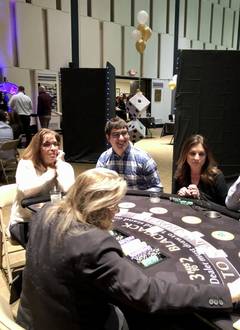Sukkot 5779: Simple Joys
10/04/2018 06:33:29 PM
| Author | |
| Date Added | |
| Automatically create summary | |
| Summary |
The elements of this experience were rather simple: bread, cheese, vegetables, sunshine. And yet it was profoundly pleasant in a way that few things are. I've certainly been to very fancy parties that were less satisfying than our sukkah lunch.
Sukkot is dedicated to this kind of profound and simple joy. Leaving the intense experiences of the High Holidays, we move into a weeklong festival that celebrates joy: the joy of a harvest that has come in abundantly, the joy of being protected by God as we traveled through the dangerous desert, the joy that filled the Temple during the special ceremonies there on Sukkot.
In the middle ages, the custom developed to read the book of Ecclesiastes on the intermediate Shabbat of Sukkot, as we did in part this morning. Ecclesiastes is the reflections of an old, mature king, who has seen it all and who tries to make sense of the absurdity of his life. “Hevel hevalim, hakol hevel” “Vanity of vanities, everything is vanity,” he begins. Everything seems fleeting and in the end, nothing seems to matter much. Certainly not the most uplifting thought.
The most famous passage of the book, which we chanted this morning, is the poem that begins “For everything there is a season, and a time for every pursuit under the heavens” (3:1). This is an observation of human society and the different moments one goes through in life. The poem consists of 14 pairs of activities which are mostly opposites, like planting and uprooting or wailing and dancing.
But beyond the poem's clear structure and order is a sense also of chaos and unpredictability. The pairs of activities do not appear in a consistent order; sometimes the more positive one is first and others the negative. The poem, as Rabbi Benji Segal writes, “floats on a sense of order beyond control, a sense of balance that may not be obvious at any one moment, and a sense that one might, though not through steps in his control, find his actions coordinated with cosmically proper time.” In other words, there may be a time for every purpose under heaven, but good luck figuring out what time it is right now!
As I mentioned, these pairs of activities mostly consist of very clear opposites: seeking and losing, loving and hating. But there is one that is not as clear, the very first one: a time to bear children (“to be born” is a mistranslation) and a time to die. While these moments mark the beginning and end of one's life, birth isn't really the opposite of death. Rather, life is. So the verse should say, “A time to live and a time to die.”
A comment attributed to the Hofetz Hayim, a 19th and 20th century leader of European Orthodoxy, notices this discrepancy. He infers from the fact that “a time to live” does not appear in the poem that there is, in fact, no time to simply live. “A person is always so anxious and busy,” he writes, “and life is so short, that there truly is no time to live.”
Again, not the most uplifting thought. But the Hofetz Hayim here reminds us of an important truth. It is easy to simply let our lives go by, to merely exist and to never find the time to truly live. Perhaps the point here is that there is not designated time to live, as there are for the other activities in the poem. Rather, we need to make the time to live, time to simply enjoy simple things and feel alive.
In his own way, Ecclesiastes seems to have come to the same conclusion. After seeking fulfillment in sensual pleasures, wealth, wisdom and work, finding the downsides of them all, he concludes with the following simple advice: “9:7 Go, eat your bread in pleasure and drink your wine with a merry heart, for God has already favored what you are doing. 9:8 Let your garments be white at all times, and let oil not be lacking for your head. 9:9 Enjoy life with a person you love during all your absurd [hevel] days that God gives you under the sun, all your absurd days, for this is your portion in life and in your toil at which you labor under the sun.”
The best path through life, he suggests, is to find moments to enjoy what we have, without striving for more, always aware of the fleetingness of everything, but not letting that stop us from enjoying the present moment. As Rabbi Harold Kushner summarizes Ecclesiastes' conclusion: “[Life] is not about writing great books, amassing great wealth, achieving great power. It is about loving and being loved. It is about enjoying your food and sitting in the sun rather than rushing through lunch and hurrying back to the office. It is about savoring the beauty of moments that don't last, the sunsets, the leaves turning color, the rare moments of human communication. It is about savoring them rather than missing out on them because we are so busy and they will not hold still until we get around to them” (When All You've Ever Wanted Isn't Enough, 142.)
For this reason, despites its gloomy passages, Ecclesiastes is the perfect book for Sukkot, as the holiday encourages us to experience this same truth. Sukkot is how we make time to live, how we set aside a week at the turn of the year to enjoy the simple pleasures of family, community, good food, the bounty of nature. We enjoy these things not in spite of the fact that they do not last, but because they do not last.
The symbols of Sukkot also celebrate this transience and vulnerability. The willows barely last the week of Sukkot, and even the plump Etrog eventually shrivels up to just its core. The sukkah is also a temporary structure, its poles and walls packed away and its vegetable roof wilts. We sit in the sukkah and enjoy being partially exposed to nature, enjoying both its bounty but also exposed to nature's ferociousness: beating sun and pounding rain and annoying mosquitos, or worse.
We seem to be saying through these rituals, “Yes, all good things eventually end. Something bad could happen at any moment. But these realities will not stop us from enjoying what we have now.” We enact this idea by bringing the inside outside, we peek through the roof of the Sukkah at the sky that could bring blessing or disaster or both.
But, it must be said, our vulnerability on Sukkot is only performative, as my friend Maya Zinkow reminded me this week. The Mishnah (Sukkah 2:9) teaches that once it starts to rain enough to spoil our food, we can move our celebration inside. So while we make a big show of our vulnerability on this holiday, we actually aren't that vulnerable. We can always retreat to the house.
So as we enjoy the simple pleasure of Sukkot, let us also be mindful of those for whom vulnerability is not a week-long performance, but a way of life. The people whose permanent dwellings are more like Sukkot than real homes. The people who may not be sure about their next meal. The people, especially but not only women, who at any moment could be violated, humiliated and traumatized by an assailant who thinks he will never face the consequences of his actions. For such people, their vulnerability does not end with Sukkot.
So during this time of rejoicing, may we resolve to build a sukkat shalom, a shelter of peace, over all of us, to enable everyone to have a life full of the simple joys we celebrate today. Shabbat Shalom and Moadim l'simcha.
Sat, November 8 2025
17 Cheshvan 5786
Photo Gallery
Photo Albums
Upcoming Events
-
Friday ,
NovNovember 14 , 2025Give Thanks at Tot Shabbat 2025
Friday, Nov 14th 5:30p to 6:30p
-
Tuesday ,
NovNovember 18 , 2025Women's Rosh Chodesh Group
Tuesday, Nov 18th 12:00p to 1:30p
New Women's Rosh Chodesh Group Tuesdays, 12:00-1:30pm Gather with Cantor Sklar and KTI friends at the start of each month of the Hebrew calendar to learn about the themes and traditions of the coming month. Learn from each other, learn more about each other and better understand the women within our tradition. Enjoy music and lunch together! Please a dairy or parve lunch to enjoy at noon, followed by the discussion at 12:30pm. KTI will provide drinks and dessert. RSVP Appreciated -
Wednesday ,
NovNovember 19 , 2025Rabbi, May I? Modern Responsa
Wednesday, Nov 19th 10:00a to 11:30a
Wednesdays, 10 - 11:30 AM, KTI Library Ever since Abraham’s famous argument with God, Judaism has been full of debate. Moses and Korah, David and Nathan, Hillel and Shammai, the Vilna Gaon and the Ba’al Shem Tov, Spinoza and the Amsterdam Rabbis . . . the list goes on. No wonder that Judaism cherishes the expression machloket l’shem shamayim, “an argument for the sake of heaven.” Beyond their historical importance, what makes these disputations so compelling is that nearly all of them, regardless of their epochs, are still being argued. The parade of characters spanning three millennia of biblical, rabbinic, and modern disputation reflects the panorama of Jewish history with its monumental political, ethical, and spiritual challenges. This series will examine Jewish responses to exile from the biblical period to our modern day. Considering texts from all genres of Jewish literary creativity, we will explore how the realities and iterpretaions Join as we re-open these timeless debates that lead us to the core of 3,000 years of Jewish conversation. • Justice: Abraham vs. God (October 19) • Holiness and Authority: Moses vs. Korah (November 9) • Inclusion: The Five Daughters vs. the Twelve Tribes (November 30) • Accountability and Morality: David vs. Nathan (December 21) • Resistance: Ben Zakkai vs. the Zealots (January 18) • Law: Hillel vs. Shammai (February 15) • Spirituality: The Vilna Gaon vs. the Baal Shem Tov (March 15) • Boundaries: Spinoza vs. the Amsterdam Rabbis (April 19) • Religious Evolution: Geiger vs. Hirsch vs. Frankel (May 10) • Zionism: Herzl vs. Wise (May 31) -
Wednesday ,
NovNovember 19 , 2025Wrestling with God
Wednesday, Nov 19th 8:00p to 9:30p
Wrestling with God Wednesdays, 8-9:30 PM Congregants’ homes TBA We need to talk about God. And about how we talk, and don’t talk, about God. It’s a big topic, maybe the biggest. This offering invites adult learners into compassionate inquiry, deepening their relationship to Jewish text through collective exploration. Using the album s*ngs ab-ut g?d [https://open.spotify.com/album/6JEY2AN6awAxNfWwmXX460] by Jewish educator Eliana Light as a starting point, this series blends music, Hebrew text study, and open-ended questions to help participants examine their own connections to the divine. This is sacred work. It’s not about getting it right. It’s about showing up with curiosity, humility, and a willingness to join the long lineage of Jews who wrestle with God. Each session stands alone, but we’d love to have a consistent group as much as possible. Dates: September 10: skyman October 22: shadows November 19: in the silence December 10: if only January 21: lead me back February 11: three steps March 11: beyONEd April 29: the mountains May 20: the name June 17: I rise -
Thursday ,
NovNovember 20 , 2025Coffee with the Rabbi
Thursday, Nov 20th 8:00a to 9:00a
Start your morning with some caffeine and casual or meaningful conversation! Join Rabbi Goldberg for a Coffee Chat! Stop by Rye Ridge Starbucks any of the following Thursdays, between 8-9am: June 12 and 26 July 10 and 24 August 7 and 21 September 4 and 18 October 16 and 30 November 6 and 20 December 4 and 18
Privacy Settings | Privacy Policy | Member Terms
©2025 All rights reserved. Find out more about ShulCloud






